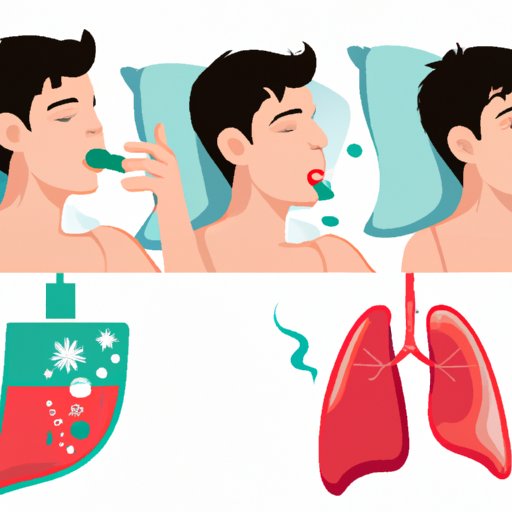Introduction
Do you find that your cough worsens at night when you lie down to sleep? This phenomenon can be frustrating and even disruptive to a good night’s sleep. Fortunately, there are several reasons why coughing can worsen when lying down, as well as various methods to alleviate this issue. In this article, we will explore the science behind why coughing worsens when lying down, how sleeping position affects coughing, practical remedies to reduce coughing during the night, and medical conditions that can lead to night-time coughing.
Top 5 Reasons Why Your Cough Gets Worse When You Lie Down
There are various reasons why coughing can worsen at night. Below are the top five causes.
Postnasal Drip
Postnasal drip is a common condition that occurs when excess mucus from the nose and sinuses drips down the back of the throat. This can irritate the throat, causing coughing, especially when lying down.
Acid Reflux
Acid reflux occurs when stomach acid flows back up into the esophagus, causing a burning sensation in the chest and throat. This condition can cause coughing, especially when lying down, as stomach acid can flow more easily into the esophagus when in a horizontal position.
Allergies
Allergies can cause inflammation and irritation in the respiratory system, leading to coughing. When lying down, allergens such as dust mites can settle in the nasal passages and airways, aggravating coughing.
Asthma
Asthma is a chronic respiratory condition that affects the airways and causes shortness of breath, wheezing and coughing, which can often worsen at night.
Heart Failure
Heart failure is a condition where the heart is unable to pump enough blood to the body’s organs and tissues. Fluid can build up in the lungs, leading to coughing and difficulty breathing, especially when lying down.
Science of Coughing at Night While Lying Down: Explaining the Phenomenon
Coughing is a reflex action of the respiratory system designed to clear mucus and foreign particles from the airways. When lying down, the position of the lungs changes, and they may not be able to clear secretions as effectively as when in an upright position. Furthermore, when in a horizontal position, mucus can accumulate in the throat, triggering coughing.
Understanding the Connection between Sleeping Positions and Coughing
The sleeping position can affect coughing. Sleeping on your back causes the tongue and soft palate to collapse to the back of the throat, narrowing the airways and leading to snoring and coughing. Sleeping on your side can help prevent this as it opens up the airways and improves breathing. For those with coughing issues, sleeping with an elevated head can help reduce mucus buildup and alleviate coughing.
The Role of Gravity: Why Coughing is More Aggravating When You Lie Down
Gravity plays a significant role in coughing when lying down. When standing upright, gravity helps mucus to move down the airways towards the throat, making it easier to cough it up and clear it out. When lying down, mucus can accumulate in the lungs and airways, making it more difficult to cough it up. This can cause coughing and other respiratory issues.
Simple Remedies to Ease Coughing at Night While Sleeping
There are simple remedies that can help reduce coughing at night:
Use a Humidifier
Using a humidifier can help moisturize the air, reducing irritation in the throat and lungs.
Drink Warm Liquids
Drinking warm liquids, such as tea or warm water with honey and lemon, can help soothe the throat, reducing coughing.
Elevate the Head
Propping up the head with an extra pillow or raising the head of the bed can help reduce mucus buildup and ease coughing.
Night-time Coughing: Causes and Solutions
Aside from the common causes mentioned earlier, night-time coughing can also result from medication side effects or exposure to irritants such as tobacco smoke or pollution. Depending on the cause of the cough, treatment may involve avoiding irritants, changing medications, or seeking medical help for underlying conditions.
Medical Conditions That Can Lead to Night-time Coughing When You Lie Down
Several medical conditions can cause or worsen night-time coughing:
Chronic Obstructive Pulmonary Disease (COPD)
COPD is a progressive respiratory condition that obstructs the airways and increases mucus production, leading to coughing, shortness of breath, and reduced lung function.
Pneumonia
Pneumonia is a respiratory infection that inflames the air sacs in the lungs, leading to coughing, fever, and difficulty breathing.
Lung Cancer
Lung cancer can irritate the airways and cause coughing, hoarseness, and shortness of breath.
Pulmonary Embolism
Pulmonary embolism occurs when a blood clot travels to the lungs, causing shortness of breath, chest pain, and coughing.
Conclusion
Coughing at night when lying down can be disruptive to a good night’s sleep. However, with the knowledge of the science behind the phenomenon and tips for reducing coughing, individuals can alleviate this issue. If coughing persists or is accompanied by other symptoms, it is crucial to seek medical attention as an underlying condition may be present.
